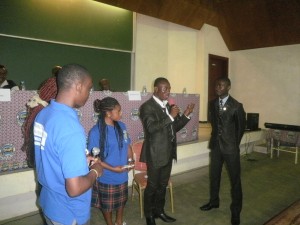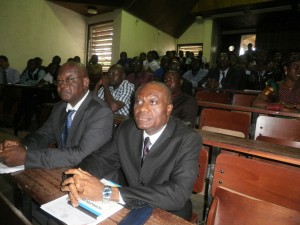Walter Wilson Nana
Buea, Cameroon
For nineteen years Cameroon is a member of the Commonwealth of Nations, where she has been benefitting as well as making its own contribution to the political, economic, social, educational, technological and cultural pools of the international organisation.
Like in previous editions, the University of Buea, UB, styled in the Anglo-Saxon tradition, a feature of the Commonwealth, joined the rest of Cameroon to celebrate the Commonwealth Day, Monday, March 10 2014.

Members of the UB Commonwealth Students' Union perform a sketch on the virtues of the Commonwealth of Nations
At a round-table conference tailored around the 2014 theme of the Commonwealth; Team Commonwealth, Associate Professor of Sociology and Anthropology in UB, Dr. Emmanuel Vubo Yenshu on a discourse dubbed; “Sociology of International Relations” said the Commonwealth is also in the new world order of continuous evolution, beginning from the 19th century till date.
The varsity don looked at the Commonwealth as a replay of the colonial relationships between the father and the

L-R UB Deputy Vice Chancellor, Dr. Epah Fonkeng and Registrar, Prof Roland Ndip, follow the discussions of the round-table conference.
son figure, citing England and most members of the Commonwealth of Nations, especially those countries that were colonised by England. “You can see this model in other blocks like the Francophonie with French speaking countries led by France and the Lusophone countries led by Portugal,” Yenshu mentioned.
He saw in the theme a call for unity, a moment for transformation and greater responsibility for the Commonwealth to face the challenges of competition from other international blocks.
Yenshu will invite the Commonwealth to reconstitute itself into a more powerful, political, economic and social force in the wake of stiff competitions from sister blocks across the world.
On the contributions of the Commonwealth to Cameroon, Dr. Nkongho Ta-Mbi of the Department of Political Science and Administration, UB focussed his paper on the electoral process and reforms in Cameroon. He noted that upon joining the Commonwealth of Nations in November 1995 as a full-fledged member, Cameroon was advised to organise credible elections, a political feature cherished by the Commonwealth.
Dr. Nkongho explained that after pressure from the Commonwealth, the government of Cameroon started opening up, with the creation of the National Elections Observatory 1 and 2 in 2005. “In 2006, the government of Cameroon created a body with the responsibility to organise and manage elections in Cameroon christened, Elections Cameroon, ELECAM. ELECAM will become operational in 2008 with twelve members from same political party, the CPDM. The Commonwealth quarrelled the government of Cameroon and six members from other political leanings in the country were brought in so as to improve the democratic governance of the structure,” he added.
According to Dr. Nkongho, the Commonwealth of Nations is interested in building institutions and the mindset of the citizens and since they do not know when the institutions will end, they preoccupy themselves in that area, capacity building.
Dorothy Forsac, Lecturer in the Department of Women and Gender Studies, UB spoke on the Gender Equality component of the Commonwealth, saying much is yet to be achieved in that area despite the efforts being put in by the Commonwealth of Nations. She observed that the Commonwealth is out to promote a thirty percent representation of women in the parliaments of Commonwealth countries, yet it is taking too long for most Commonwealth countries to achieve that goal. “Though Cameroon is a member of the Commonwealth for the past 19 years, it is only the 2013 Municipal and Parliamentary Elections that have enabled Cameroon’s House of Assembly to have a thirty percent representation of women. The Cameroon Senate though just instituted is yet to experience that,” she mentioned.
Forsac said the Commonwealth has a good vision but the problem is for the member states and governments to implement the lofty ideas.
On a Socio-Cultural look of the Commonwealth, Dr. Athanasius Amungwa of UB’s Department of Sociology and Anthropology said the Commonwealth is preaching educational for all, while reiterating the importance to achieving universal primary education, distance learning and mitigating the impact of HIV/AIDS in education.
Amungwa mentioned that the Commonwealth Games, which come up every four years, receive a lot of attention, with athletes coming from Commonwealth countries. This, he said is a positive cultural value of the Commonwealth. He lauded the Commonwealth initiative of promoting good health, housing and the fight against poverty.
The scholar on sociology said Cameroon has benefitted from the Commonwealth in the areas of capacity building, music, other forms of arts and sports.
Earlier, Dr. George Epah Fonkeng, UB’s Deputy Vice Chancellor in charge of Research, Cooperation and Relations with the Business World said the Commonwealth is a unique global family of 53 countries with about 2.4 billion people across six continents. He said UB has benefited from some of the finest scholars the Commonwealth can offer, some Commonwealth scholarships, cooperating with other Commonwealth researchers and being a member of the Commonwealth Scholarship Association.
The ceremony also saw the reading of the Queen of England’s speech for Commonwealth celebrations 2014 and that of the Commonwealth Secretary General, Prof. Karmalesh Sharma. They all stressed the spirit of unity, collaboration as Commonwealth countries brave up for the 2014 Commonwealth Games slated for Glasgow, Scotland come July 2014.
This year’s theme – Team Commonwealth, expresses a spirit of friendship and was approved by Her Majesty, the Queen of England in consultation with the Commonwealth SG and the Commonwealth Council.



